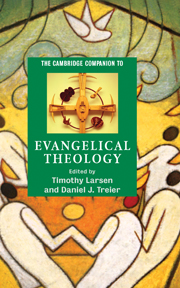Book contents
- Frontmatter
- 1 Defining and locating evangelicalism
- Part I: Evangelicals and Christian doctrine
- 2 The triune God of the gospel
- 3 Scripture and hermeneutics
- 4 Jesus Christ
- 5 The human person in the Christian story
- 6 Justification and atonement
- 7 The Holy Spirit
- 8 Conversion and sanctification
- 9 The church in evangelical theology and practice
- Part II: The contexts of evangelical theology
- Index
3 - Scripture and hermeneutics
from Part I: - Evangelicals and Christian doctrine
Published online by Cambridge University Press: 28 September 2007
- Frontmatter
- 1 Defining and locating evangelicalism
- Part I: Evangelicals and Christian doctrine
- 2 The triune God of the gospel
- 3 Scripture and hermeneutics
- 4 Jesus Christ
- 5 The human person in the Christian story
- 6 Justification and atonement
- 7 The Holy Spirit
- 8 Conversion and sanctification
- 9 The church in evangelical theology and practice
- Part II: The contexts of evangelical theology
- Index
Summary
Evangelicals understand themselves as confessionally orthodox Protestants oriented to piety that is personal. Therefore they claim to embrace not only the Trinitarian and Christ-centered biblical doctrine expressed in the Nicene Creed, but also the basic understanding of Scripture's authority that was held by the church fathers - in a Protestant way.
The Eastern Orthodox churches respect the authority of Scripture as a (foundational) subset of the church's great Tradition; the Roman Catholic communion respects Scripture as the ultimate written source of God's Revelation in Jesus Christ, but grants to Tradition (via the magisterial teaching office of the church) a decisive role in its interpretation. The Protestant distinctive of sola scriptura, “Scripture alone,” rejects the “coincidence” and “supplementary” views of Tradition's relation to Scripture in favor of an “ancillary” view: contrary to popular misconceptions of nuda scriptura, tradition plays a vital role when understanding God's revelation via Scripture, but the role is “ministerial” rather than magisterial. Scripture is the final authority over, but not the sole source of, Christian belief and practice. Evangelicals have used underlying concepts from the Protestant Reformation to support this theological sufficiency: “the priesthood of all believers” and “the clarity of Scripture.”
- Type
- Chapter
- Information
- The Cambridge Companion to Evangelical Theology , pp. 35 - 50Publisher: Cambridge University PressPrint publication year: 2007
- 1
- Cited by

